This tribute to rockabilly legend Eddie Gaines and the Rockin’ Five is a deep dive into the band that helped make Eddie arguably THE face of rockabilly music in Kentucky. Back home (and thanks to his grandmother) Eddie was generally known as “Bill” Gaines and later “Brother Bill”. For sake of the legions of rockers around the world who know him as Eddie I will use that name. The source material is taken primarily from my interview with him back in 2000 and supplemented recently by my correspondence with Gerald Plain. Once more, I am going Beyond the Bluegrass to focus on a career that is very important to me and I hope it is enjoyed. [2024 Shawn Chambers / Lexingtunes]
We also played at the drive-in. It had a platform built on top of the concession stand and we would play there until 9:00. There was so much energy. So much energy in all the guys. And we were used to having crowds around us. Most of the time it was teenagers dancing at the sock hops. I mean boppin’ and rock n’ rollin’ and put me up there on that and I was confined. I just can’t… I mean give me ROOM! Well, there’s no way they could confine me. I couldn’t be still. One thing that I know I’m better than Elvis at – he shook the one leg and I shook ‘em BOTH! [laughs]. And I preach the same way. – Eddie Gaines
Western Kentucky’s coal fields garner far less attention in the historical record than those found in the Appalachian Region, but the lives of the miners and their families during the boom days of the 1900s were every bit the same struggle as those hundreds of miles to the east. The Gaines’ patriarch, Edward Lee, broke his back in those pre-union days struggling to provide for his family on a monthly salary of $30. An oft told tale, Edward was in debt to the mining company before even starting his job thanks to company housing and the company store. Despite being bone tired in his off hours he managed to carve foundation blocks and buy roughhewn oak lumber to build a home. His wife, Mae Gaines, worked equally as hard with the countless household chores in addition to sewing clothing and the heavy fabric for their straw filled mattresses. This is the world that Edward Millard Gaines was born into on a White Plains, Kentucky, summer day in 1935.
Like the coal, a rich vein of musicians ran through the counties of Muhlenberg and Hopkins and Eddie got an itch at an early age. He first took up guitar around age nine by learning some basic chords from his father. Any young picker has frustration in the early days, but for Gaines it required more patience and some real improvisation due to a serious injury to his left hand a few years prior. This incident could just have easily ended his life as Gaines recalls:
Now, of course, around here in the mines and all it wasn’t uncommon for people to shoot off blasting caps—you know like for dynamite. I had seen daddy take one of them and stick a slow fuse in it and throw it and duck behind a tree with the rest of us… and BOOM!!
Well, I was six and we had gone back to White Plains from Crittenden County to see my aunt. Now the war [WWII] had just started and we knew that gunpowder was going to be hard to get and so I didn’t expect to have any fireworks for a while. I was playing around the area and had found some blasting caps in the springhouse. They must have been out of reach up in the joists, but had fallen down. Now I put one in each chest pocket, one in each pants pocket, and I had my cuffs rolled up like yours are now—I put one down in each cuff.
My mother sent me across the way to borrow some milk and I was real excited because that was where my cousin was and he was my best friend. I wanted to see him and show him my ‘firecrackers’ ‘cause that’s what I thought they were. I remember running the whole way over and when I got there I told him to get me a kitchen match and we would light one. Well, he grabbed me a long kitchen match and I stuck it in there and before I could even throw the thing – there went my fingers. It took the top half of my thumb off, most all of my forefinger and half my middle finger. Plus the muscle on my right arm was near about ripped off. I still have some little pieces in my arm and in my eye. They later found one of my finger bones stuck in the side of the house!
In Kentucky, you carry on.
It was in his late teen years when he first had a guitar to call his own and it became a common sight in the area to see the young man carrying his double F-hole hollow body over his shoulder from place to place. With his shock of curly hair and handsome features, Gaines was already genetically predisposed to becoming a front man. The rest would come by hard work and countless hours playing and singing country music wherever he could.
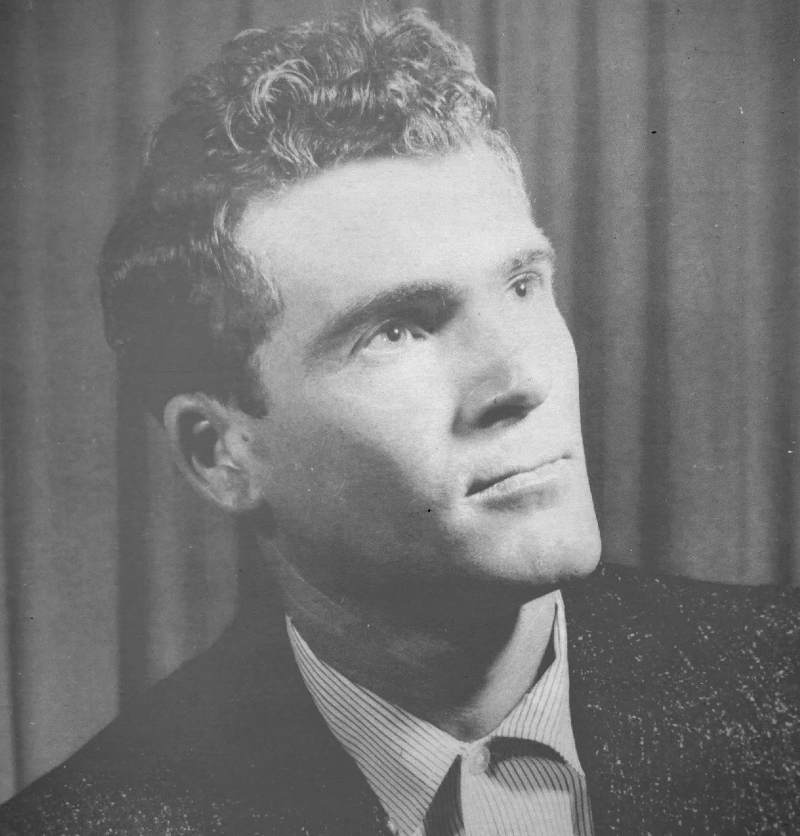
While Gaines honed his skills, big things were happening in nearby Central City. In 1955, competing radio stations took to the airwaves in WNES and WMTA. The rivalry was immediate and sometimes less-than-friendly. WNES had the “Dave Rich Show”, featuring the Melody Ranch Hands and this exposure would lead to a record contract with RCA Victor for Rich. Meanwhile at the voice of the Messenger and Times-Argus (thank goodness for call letters) “The Saturday Jamboree” was launched featuring a variety of local acts with disc jockey Johnny Tooley organizing a staff band to back them up.
With rock and roll sweeping the nation and the ability for small labels to press 45s affordably at commercial plants, it was only a matter of time before Central City went ‘on the record.’ Bobby Anderson was WMTA’s commercial manager and sports editor, and he approached Johnny Tooley to make a demo that started the ball rolling. This 1958 custom press release on Nashville’s Starday label of “Kings of Dreams / Looking Glass Heart” made a big impact locally.
In his book “That Muhlenberg Sound” Bobby Anderson recalls it was this recording that brought Gaines to him, but decades later Eddie was uncertain:
Probably what happened was Bob Bethel was a barber [and fiddle player on the Jamboree] and he cut my hair. I’m just saying possibly, because I honestly do not remember. Probably or possibly probably, Bob said something about this or what was happening and said why don’t you come over or something like that. If I had to make an educated guess or an uneducated guess—that’s what I’d make ‘cause I have forgotten completely how it all came about.
What is certain is that before Eddie would get his shot at the station’s mono-Ampex tape recorder he needed a band. Enter the members that would become the Rockin’ Five.
Two brothers from Hopkins County were already regarded by those in their hometown of Anton as fine musicians and multi-instrumentalists. David Bowles (b. 1937) was a solid rhythm guitarist but had no problem holding his own on an upright bass. His teen brother, James “Jimmy” Bowles (b. 1942) played many styles of piano, and was also a strong bass player. The two had played often together in a host of string bands at local functions and amateur contests since the mid-1950s.
A fantastic lead guitarist could be found just a bit further north and by crossing the line into Webster County. Carol “Chick” Chandler (b. 1937) from Slaughters hooked up with the Bowles brothers and is known to have appeared with them at least as early as 1956. His thumb-picking style was clearly the influence of Merle Travis and others from nearby Muhlenberg County.
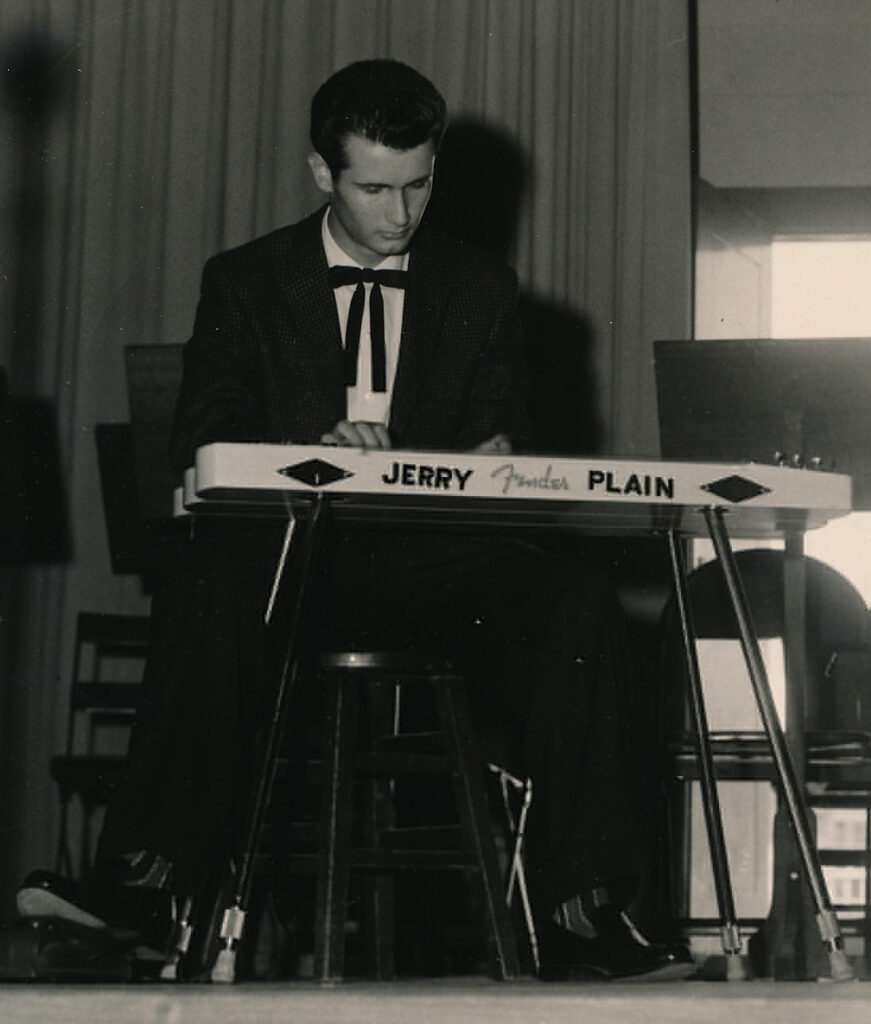
At the time rock ‘n roll still slanted heavily to the country side in Kentucky and a steel player was commonly found in bands in the tri-county area. From Sacramento in nearby McLean County, Gerald “Jerry” Plain (b. 1940) learned of the Bowles’ band from a mutual acquaintance and arranged to meet with them at their home in Anton. Plain had taken up the steel after hearing it on Hank Williams’ recordings and his Fender added another layer of depth.
Lastly, in early 1958, William “Bill” Lightfoot (b. 1940) from the nearby city of Madisonville became a welcome addition on drums.
The first intersection with Eddie is a bit foggy, but Plain was a performer on the Saturday Jamboree and was known to Bobby Anderson so it was possible this was the connection. Likewise, Eddie could have easily seen the boys performing nearby and delivered a recruitment pitch centered around his desire to make a record for Bobby’s newly formed Summit label in Central City.
These early days were a series of rehearsals, a gig at South Hopkins High School, and an appearance on an Evansville, Indiana, television station for a contest sponsored by Holland Dairy. Jerry Plain remembers that Eddie “showed some sophistication when he started to play with our group. He knew how to wiggle and throw himself around, and he also sung with a raspy voice — good for rock n’ roll.” Gaines was clearly all-in and had promotional photos produced in Madisonville and worked with Chick Chandler to find the music to back his pocketful of lyrics for the initial release.
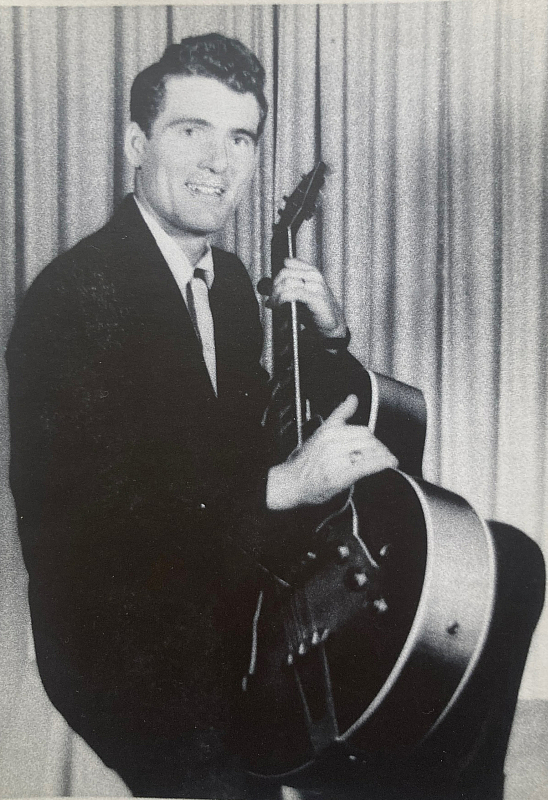
Summit 101 is now the stuff of rockabilly legend becoming one of the most sought records of the genre, but at the time the monster “Be-Bop Battlin’ Ball” was relegated to the B-side in favor of a feature ballad “Try This Heart For Size.” Production for both sides was likely handled by Johnny Tooley alongside Bobby Anderson.
The alliterative title cut is the clear winner and is two minutes of rockabilly perfection. A driving beat and hot guitar backs Gaines as he belts out the teen-friendly lyrics:
Well, the cats are a jumpin’ man they’re really doing it right
I said the cats are a jumpin’ man they’re really doing it right
You gotta clear the floor ‘cause we’re gonna mop it tonight.
The dreamy “Try This Heart For Size” fully utilizes the echo setup at WMTA. Despite the heartfelt lyrics and delivery, the inspiration for this one was something less than romantic – a pair of shoes!
Well, this song we’re listening to right now happened because my wife bought me a pair of white bucks—I wore black. White bucks… she bought me a pair. And I said ‘Those don’t fit’ and she said ‘Try them on’ for the fit you know. ‘Try ‘em on for size’ and that was it. [laughs] – Eddie Gaines
Gaines recalls the pressing as “500 copies. Just 500 copies. Somehow, they [Summit Records] had a connection with Starday. I think what they were wanting to do was move me from Summit to Starday and then later maybe move me to Mercury ‘cause Bobby [Anderson] had a contact with somebody at Starday.”
The squares at Billboard failed to give it an individual review, but lumped it into the “rated 70 or less” category. Cashbox was far more enthusiastic calling “Be-Bop Battlin’ Ball” a “rafter-shakin’ juke box entry” and a “solid swinger for the dancin’ teensters.”
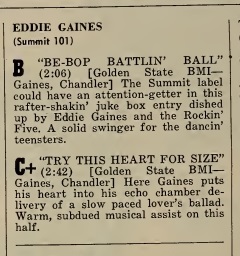
Despite the well-deserved adulation in subsequent decades from rockabilly fans worldwide, there has always been a dark shadow over the record for those involved in its creation. Jerry Plain remembers the agreement had always been that this first record was going to be released under a single name (perhaps something as innocent as the Rockin’ Six) and the cost was to be split evenly. Upon seeing the records with Eddie’s name above the band (now dubbed the Rockin’ Five on the label) the boys were not amused given all the work they had put into preparing for the recording session.
Eddie decided differently after the recording session. I always felt that Bobby Anderson had some persuasion on what Eddie did. Eddie undoubtedly thought that if he paid the entire session, it would be okay with his backup band. I think that he saw the possibility of fame when records would be sent out to radio stations and other entities. I believe that he thought there was a chance that his singing career could really take off, so goodbye Rockin’ Five.
So, we [Bowles boys, Chick, and myself] had a meeting at Eddie’s house. Eddie’s father was there. Jimmy and David’s father was there and my father was there. There were many hot words issued from Eddie and the Five (now Four). We soon talked to a lawyer and finally just dropped the whole issue. To my knowledge, the Five never played with Eddie again. – Jerry Plain
Most likely it was indeed Anderson who wanted the change as label owners can be more than convincing when they hold all the cards. Maybe Anderson had dangled the promise of a shift to Starday and onward as Eddie alluded to, but the band clearly felt he should have stuck to the agreement and as Plain noted the fallout was immediate.
Bill Lightfoot had already made his intentions known to drop out of the band following the recording session to spend more time on his studies. For the others, this must have been a bitter introduction to the music business. Jimmy and David had no shortage of people to play with and already had a great friend in Chick – it is likely they carried on as before. Some early sources credit these three as appearing on another Gaines release, but this seems very doubtful.
Plain, however, was not through with Summit yet. Bobby Anderson had been good at giving Jerry advance notice anytime a hot steel player was coming to the studio. A session with Billy Harlan and legendary steel player Jimmy Day stands out.
It was a recording session with Billy, a percussionist with one snare drum, Jimmy Day on steel, and maybe a rhythm guitarist. A tape was being made to present to a larger studio. Billy went into the back room to write the song — much beloved spontaneity! After a while he appeared and they rehearsed the music, then a recording was made. Then they all jammed for a long while. I was all over Jimmy Day with all eyes and ears as he made chord changes I had never heard before on steel. He had a bottle of rum on the floor. Then they all loaded into his red and white Ford and took off. – Jerry Plain
It is Jerry Plain’s steel work that can be heard behind fiddle player barberin’ Bob Bethel on Summit 103 “Millie (From the Mountain)” also issued in 1958.
Of course, Summit was also not through with Eddie Gaines either. His second release followed just a few months later and featured Eddie fronting the Spartones (who remain a mystery and may have just been session musicians). A label blip shows both “Out of the Shadows” and “I Quit Livin’” as the A-side, but with Bobby Anderson having co-written “Out of the Shadows” it is likely top dog. Backup vocals were a trio of local girls in Myrna Latham, Jeannie Ford, and Janie Arnold. As before, Anderson sent it for review to Billboard and (as before) the rag failed to give it an individual listing.
Nonplussed, Anderson continued to steer Gaines into the smooth ballad territory once more with another release in early 1959. “You’re Welcome Back” was reviewed favorably from Cash Box and Anderson was pushing it on WMTA. The flip “She Captured This Heart of Mine” is a bit more peppy. Credited this time only to Eddie, he remembers both Billy Harlan and Royce Morgan playing on this session.
Easy to be around, Eddie had gained the friendship of David “Stringbean” Akeman while performing together in Central City and Stringbean was helpful in backstage Opry introductions and musical networking. Gaines was wearing out tire rubber with constant weekend trips to Nashville and it was draining both him and his wife Loretta.
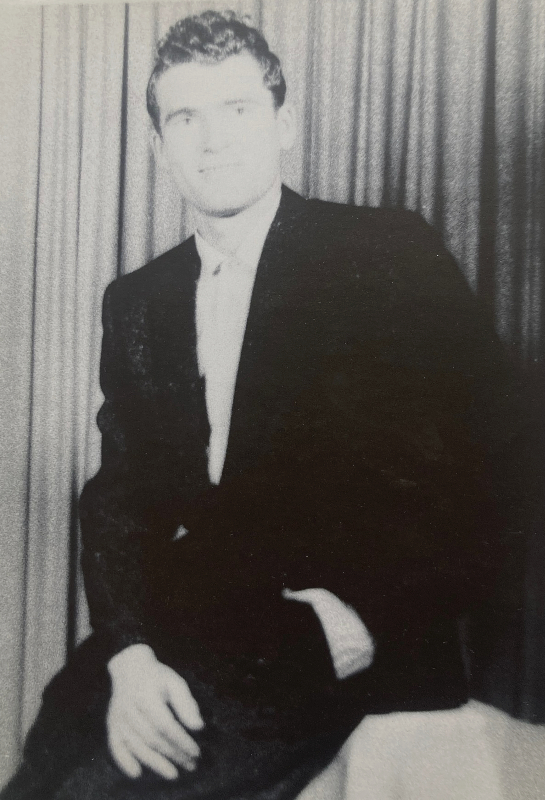
His father was a Baptist preacher and the lure of religion and a spiritual calling was always present. Gaines remembers it was “July of ’60, we had come home and I went to church, I guess for the second time in nine years. And my life was empty. Yet I was standing on the threshold of maybe. And I don’t think… and I don’t say this boastingly, but I didn’t take a back seat. I didn’t care to follow Ray Price, Faron Young, Bill Anderson or whoever.” There was still a tug-of-war between God and guitar up until the end of the year when the reluctant rockabilly quit music for good.
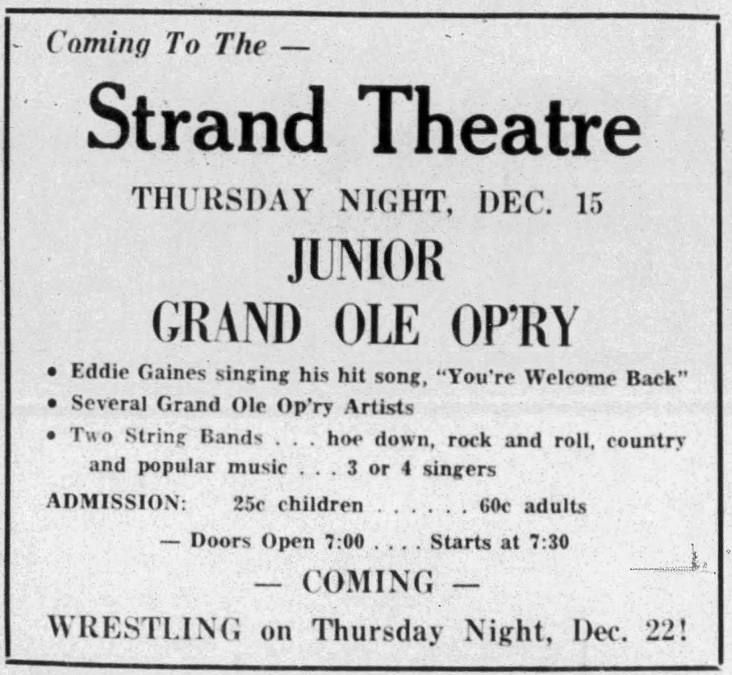
The decision to enjoy the last sunset on his music career was approached with optimism and even enthusiasm from Gaines. He recalls that final homecoming as being “just like any other weekend, but this time I knew I wasn’t going back. I began to think about my dream of being a minister and I continued my work as a strip miner and a welder around Hopkins and Muhlenberg County. Now, I was no stranger to starting a ‘new’ life. A life outside of music. When ‘Retta and I got married back in ’53, I had thirty-five dollars and no job… and that was 47 years ago. So, I knew she would stand by my decision to quit and be just as happy.”
No stranger to hard work, Eddie spent the next 42 years with Peabody Coal and became a strong advocate within the mining union. Like his miner father he also fulfilled his dream of becoming a Baptist preacher and leading his own church. Music was always in the back of his mind and after having laid the guitar down for so many years, later in life he began playing gospel music – a tradition carried on by his son, Spencer.
I sit right here at night now and it’s not that I’m sorry, because I’m not sorry. Not at all. Not at all. I wonder sometimes… could I? But, I’m not sorry, because God has been so good to me. I’ve got Home and Heaven and when I face death it’s just a door. But still I sit here and I watch it [the Grand Old Opry] and cry. Cry ‘cause I watched Ray Price last Saturday night. Oh, I told my wife that I wish I was standing there by him. – Eddie Gaines
Eddie Gaines passed away February 20, 2023 at age 87.
The oldest brother, David, founded the namesake Bowles Tool and Die Company to service the mining industry in the area. Never far from music, he established “The Barn” in Anton as a place for the community to gather and enjoy country music. David was 76 at his passing in June 2013.
It was foreshadowing that the future Dr. William Lightfoot chose studies over music back in ‘58. His life was devoted to academia. His Ph.D. in Folklore led to a lengthy research and teaching career in Appalachian culture. An expert in folk narrative and humor, he also researched heavily the contributions of African American artists to the music of Appalachia. Beyond scholarly journals, he contributed to Bluegrass Unlimited and the Encyclopedia of Country Music. His later years were spent in North Carolina and he died at age 76 in November 2016.
Jimmy Bowles made a career with the phone company. He could often be found with his brother at “The Barn”, but also played piano professionally for Madisonville’s famed Happy Goodman Family gospel group. He passed away in July 2020 at age 78.
For Carol Chandler it was a lifetime of music. He joined Odis Blanton and his Blue Star Rangers and played countless live shows as well as frequent television appearances on WBKO in Bowling Green. They continued a partnership with the establishment of Blanton & Chandler Music. A friend to local musicians in every way, Carol passed in October 2024 age 87.
Multi-instrumentalist Gerald Plain is a former college professor in music and has spent the past decades as an award-winning composer. Like Lightfoot he maintains a heavy interest in folk music and fusing these elements into his compositions. Plain is still actively composing from his home in Louisville and much more about his education and career can be found at his website.
Discography:
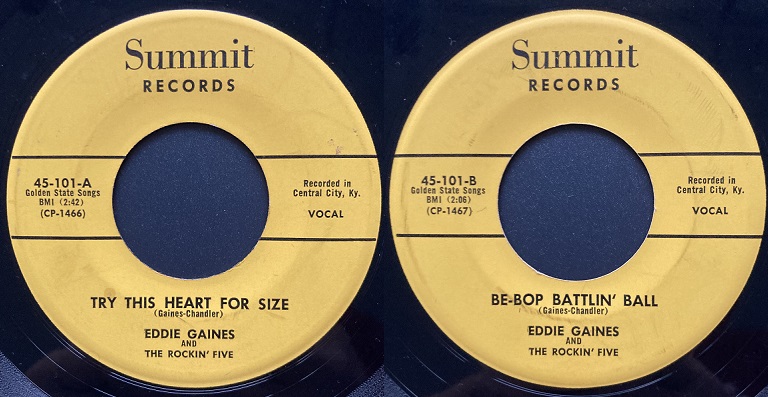
Summit 101 Try This Heart For Size / Be-Bop Battlin’ Ball 1958
Summit 104 Out Of The Shadows / I Quit Livin’ 1958
Summit 109 You’re Welcome Back / She Captured This Heart of Mine 1959
Be-Bop Battlin’ Ball has appeared on numerous rockabilly comps over the years starting as early as 1978 for Cees Klop’s White Label “Kentucky Rock-A-Billy” LP. Of course, it was only fitting that the cover featured Eddie.
Great stuff. Dean
Fantastic. Nice to finally get the full story of Eddie.
I’ve always been shocked at the lack of info about him. Crazy stuff. Thanks for dropping by my site.
Love your title “On the Threshold of Maybe.”
Even though the material gets older and older, your writing is so fresh it brings it all back home.
The brief mention of Royce Morgan prompts several questions. Is he still living? If he is, have you been in touch with him, possibly to do a story on the Royce label (Jimmy Piper).
This means a lot coming from you, John. I’ll have to dig around about Royce. I’m not sure of the top of my head if he is still with us or not. Piper would certainly be a great story!